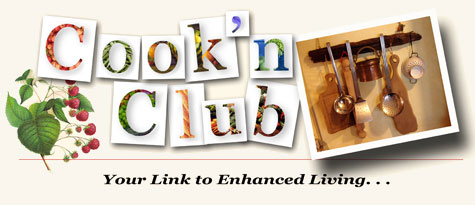Cook'n Basics 101: Dry Versus Liquid Measuring Cups
By Alice Osborne
 I'll admit it, I've been a hurried and sometimes (OK, lots of times) careless cook and baker. As an example, I often measure flour, liquids, and most other ingredients in the same glass Pyrex measuring cup. Why not? This saves washing all those assorted sized measuring cups. Doesn't everyone do this?
I'll admit it, I've been a hurried and sometimes (OK, lots of times) careless cook and baker. As an example, I often measure flour, liquids, and most other ingredients in the same glass Pyrex measuring cup. Why not? This saves washing all those assorted sized measuring cups. Doesn't everyone do this?
Well, no they don't. And here's why: Liquid measuring cups (aka Pyrex with red measurement markings) and dry measuring cups (assorted sized metal or plastic cups) measure differently. You can test this yourself using 1 cup of all-purpose flour, measuring in both the liquid measuring cup and the dry measuring cup.
 You'll find you're more accurate with the dry measuring cup because you can level the flour off evenly. It's impossible to level a cup of flour in a liquid measuring cup, and you'll be off measurement by almost 26%. That's a lot of extra flour in a recipe.
You'll find you're more accurate with the dry measuring cup because you can level the flour off evenly. It's impossible to level a cup of flour in a liquid measuring cup, and you'll be off measurement by almost 26%. That's a lot of extra flour in a recipe.
You can also test this by measuring water in both measuring cups. The dry cup can be off measurement by as much as 23% because it's so easy to overfill it (due to surface tension that allows the liquid to sit slightly higher in this type of vessel). And that's a lot of extra liquid in a recipe. It's much easier to gauge the volume of water in the liquid measuring cup, as its transparency allows you to see when the liquid has touched the 1-cup line.
 Now that we know the best tool for the ingredient being measured, what's the best way to actually do the measuring? When measuring a dry ingredient, the pros say to scoop it up (flour, for instance) with the dry measuring cup and then sweep off the excess with a flat utensil - it's the "dip and sweep" technique.
Now that we know the best tool for the ingredient being measured, what's the best way to actually do the measuring? When measuring a dry ingredient, the pros say to scoop it up (flour, for instance) with the dry measuring cup and then sweep off the excess with a flat utensil - it's the "dip and sweep" technique.
When measuring liquids, place the liquid measuring cup on the counter and bend down so the measurement markings are at your eye level. Then pour the liquid in until it reaches the desired marking. Professional chefs suggest for 100% accuracy we should use a scale. Nah, that's over the top for this hurried cook. Less careless I can be, but slowing down enough to use a scale? Probably not gonna happen.

